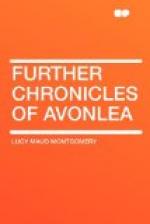August 18.
I have done it. I wrote to Paul to-day. I knew I must tell him by letter, because I could never make him believe it face to face. I was afraid I could not even do it by letter. I suppose a clever woman easily could, but I am so stupid. I wrote a great many letters and tore them up, because I felt sure they wouldn’t convince Paul. At last I got one that I thought would do. I knew I must make it seems as if I were very frivolous and heartless, or he would never believe. I spelled some words wrong and put in some mistakes of grammar on purpose. I told him I had just been flirting with him, and that I had another fellow at home I liked better. I said fellow because I knew it would disgust him. I said that it was only because he was rich that I was tempted to marry him.
I thought would my heart would break while I was writing those dreadful falsehoods. But it was for his sake, because I must not spoil his life. His mother told me I would be a millstone around his neck. I love Paul so much that I would do anything rather than be that. It would be easy to die for him, but I don’t see how I can go on living. I think my letter will convince Paul.
I suppose it convinced Paul, because there was no further entry in the little brown book. When we had finished it the tears were running down both our faces.
“Oh, poor, dear Miss Emily,” sobbed Diana. “I’m so sorry I ever thought her funny and meddlesome.”
“She was good and strong and brave,” I said. “I could never have been as unselfish as she was.”
I thought of Whittier’s lines,
“The outward, wayward
life we see
The hidden springs we may
not know.”
At the back of the little brown book we found a faded water-color sketch of a young girl—such a slim, pretty little thing, with big blue eyes and lovely, long, rippling golden hair. Paul Osborne’s name was written in faded ink across the corner.
We put everything back in the box. Then we sat for a long time by my window in silence and thought of many things, until the rainy twilight came down and blotted out the world.
IX. SARA’S WAY
The warm June sunshine was coming down through the trees, white with the virginal bloom of apple-blossoms, and through the shining panes, making a tremulous mosaic upon Mrs. Eben Andrews’ spotless kitchen floor. Through the open door, a wind, fragrant from long wanderings over orchards and clover meadows, drifted in, and, from the window, Mrs. Eben and her guest could look down over a long, misty valley sloping to a sparkling sea.
Mrs. Jonas Andrews was spending the afternoon with her sister-in-law. She was a big, sonsy woman, with full-blown peony cheeks and large, dreamy, brown eyes. When she had been a slim, pink-and-white girl those eyes had been very romantic. Now they were so out of keeping with the rest of her appearance as to be ludicrous.




